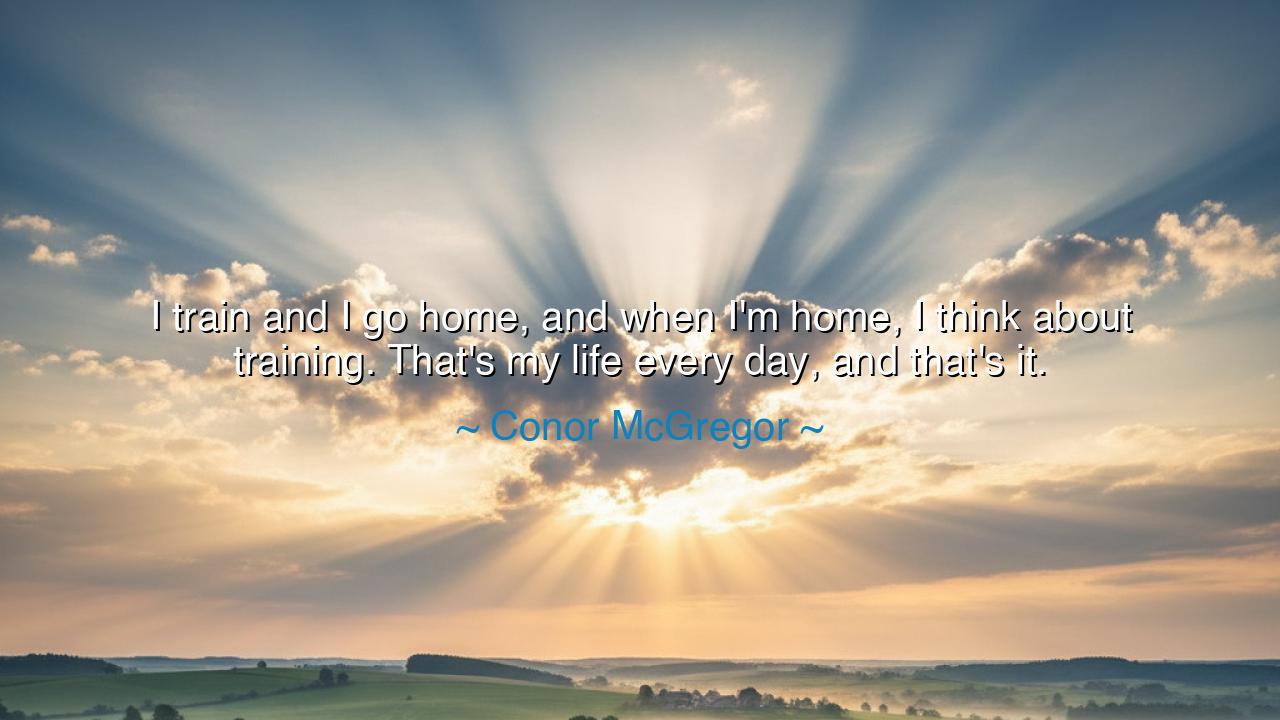
I train and I go home, and when I'm home, I think about training.
I train and I go home, and when I'm home, I think about training. That's my life every day, and that's it.






When Conor McGregor declared, “I train and I go home, and when I’m home, I think about training. That’s my life every day, and that’s it,” he was not merely describing a routine — he was revealing a philosophy of total devotion. These words, stripped of glamour, echo the timeless spirit of warriors, artists, and visionaries across the ages who gave themselves entirely to their craft. It is the voice of a man consumed by his purpose, one who understands that greatness is not born of talent alone, but of discipline, obsession, and the relentless shaping of the self. Beneath the simplicity of his statement lies the ancient truth that mastery demands sacrifice — that to rise above others, one must surrender what others will not.
McGregor’s quote speaks to the monastic rhythm of excellence. He trains, he returns home, and even in rest, his mind remains upon the fight. This is not mere repetition; it is ritual — the transformation of daily labor into sacred pursuit. The ancient Spartans lived by such devotion. Their lives were stripped of distraction; every action served the art of war. The boy became the soldier, the soldier became the embodiment of the state, and the state itself was defined by discipline. Like McGregor, they understood that to master the body, one must first master the mind — that true warriors live twice, once in the world, and once in their own thoughts, where they refine their purpose even in stillness.
Yet McGregor’s words also speak of isolation, for such devotion is not without cost. To think only of training, to live and breathe the art of combat, is to exist in a realm apart from ordinary men. The artist and the warrior both know this loneliness — the solitude of the one who strives beyond comfort. In this, McGregor joins a lineage of those who chose the narrow path: Michelangelo, who spent sleepless nights painting the Sistine Chapel, saying that “genius is eternal patience”; or Miyamoto Musashi, the legendary samurai who lived as a wanderer, forsaking all luxury to perfect his swordsmanship. These souls share a single truth — that devotion is a fire that consumes as it illuminates.
What McGregor reveals, perhaps without intending it, is the paradox of mastery: that to gain everything, one must give everything. His life is a circle of labor and reflection — train, think, train again. There is no space for the trivial, no room for distraction. This is the discipline of focus, the state the ancients called arete — excellence born of unity between purpose and action. In a world that praises variety and leisure, McGregor’s simplicity is radical. He does not chase balance; he chases greatness. And though the price is high, he pays it willingly, for he knows that mediocrity demands nothing less than your soul, while mastery requires all of it.
In his own way, McGregor’s philosophy mirrors the Zen monks of old Japan, who spent years perfecting a single strike of the sword, or the Roman gladiators, whose daily routine was blood and sweat, not glory. These men, like him, lived lives of repetition and precision — the rhythm of improvement through pain. To the untrained, such lives seem joyless; to the wise, they are sublime. For when life is narrowed to a single purpose, each breath becomes meaningful. Every motion, every thought, is part of the greater art. McGregor’s simplicity — “that’s my life every day, and that’s it” — is not emptiness, but purity of focus.
There is, however, a shadow in such devotion. To live entirely for one’s craft is to walk the edge of obsession. The ancient philosophers warned that discipline must be guided by wisdom, lest it consume the soul. The Roman general Scipio Africanus, though victorious in war, retired from public life, weary of endless struggle, knowing that the fire that had made him great might also destroy him. So too must the modern warrior remember: devotion must serve meaning, not pride. Training, though it is the path, must never become the prison. The mind must master the art, not be mastered by it.
So, O seeker of strength, let this teaching of Conor McGregor be your guide: find your purpose, and give yourself to it completely. Work until thought and action become one. Let discipline be your temple, and your craft the altar upon which you refine yourself daily. But remember, too, to temper your fire with reflection. Let your training not only strengthen your body but shape your spirit. For in the end, the goal is not victory over others, but mastery over the self.
And thus, from the words of a modern warrior emerges a lesson as old as time: to live with purpose is to be consumed by it — but in that fire, one becomes eternal. Whether you are a fighter, an artist, or a builder of dreams, live as McGregor lives — train, reflect, repeat — for greatness is not found in bursts of brilliance, but in the steady, ceaseless rhythm of devotion.






AAdministratorAdministrator
Welcome, honored guests. Please leave a comment, we will respond soon